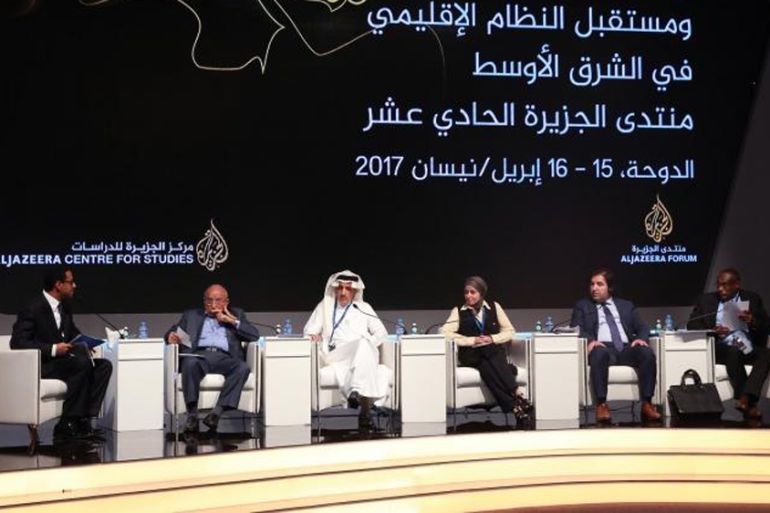Riyad Hijab: ‘Assad has no future in Syria’
Former PM and current opposition leader kicks off Al Jazeera’s 11th annual forum addressing the ‘new equation’ in Syria.

It is no longer possible for Syrian President Bashar al-Assad to remain in power, former Syrian prime minister Riyad Hijab, said at Al Jazeera’s annual forum in the Qatari capital, Doha.
“It has become clear to the allies of the [Syrian] regime that it is no longer possible for Bashar al-Assad to remain in power in light of the new equation, which is becoming apparent after the new United States administration,” said Hijab at the opening of the event.
Keep reading
list of 4 itemsEgypt’s President el-Sisi to run for third term, opposition decry pressure
Tunisian police arrest two top officials in Ennahda opposition party
The Arab Spring is not dead
The forum kicked off its 11th year on Saturday under the slogan “State Crisis and the Future of the Middle East”, bringing together a wide range of politicians, academics, and journalists to discuss the biggest dilemmas facing the Arab world.
|
|
Hijab, who defected from Assad’s government following the 2011 uprising, condemned Russian and Iranian interference in Syria, and the lack of international will to act on the targeting of civilians, shedding light on the government’s use of chemical weapons.
Earlier this month, a suspected chemical attack hit Syria’s Idlib province, killing at least 87 people, and drawing international outrage. Many western leaders, including US President Donald Trump, accused Assad’s forces of carrying out the attack.
In retaliation, the US launched dozens of cruise missiles at a government-controlled airbase in Syria, the first direct military action the US has taken against Assad forces since the start of the conflict.
“After the chemical attack, the US administration’s strike has changed all calculations. In the last round of talks [in Geneva], we felt that there was a lack of willingness to act, especially amongst the Europeans,” Fadel Abdul Ghany, founder of the Syrian Network for Human Rights, told Al Jazeera at the forum.
“Now, the Americans are building a strategy, which does not include Assad or Iran in Syria. Maybe not in this phase, but something has really changed. Syria is now a priority,” added Abdul Ghany.
READ MORE: Aleppo blast – Syrian evacuation convoy targeted
The two-day forum is concentrated on tackling key questions related to the crises of Arab states and their impact on the region at large.
Panellists will discuss the Arab Spring, the role of youth in the region, Israel in the Arab world, the options for Arabs vis-a-vis emerging regional powers, and the future of the Middle East.
Arab Spring was ‘a tragedy’
The Arab region has been particularly unstable since the string of uprisings in 2011, dubbed the “Arab Spring”, which attempted to topple decades-long dictatorships.
The subsequent rise of the Islamic State of Iraq and the Levant (ISIL, known as ISIS) armed group, which seized large swaths of territory in both Syria and Iraq in 2014, wreaked havoc on the region. Today, countrywide conflicts plague a number of states in the region, including Syria, Iraq, Libya, and Yemen.
READ MORE: Syrians have been in the US all along, Donald Trump
The failure of the Arab Spring was due to the lack of coordination between the popular uprisings, steered away from one another by the governments of the region, said Youssef Choueiri, a professor of history at the Doha Institute for Graduate Studies.
“The Arab spring has become a grave catastrophe, a tragedy, which lifted the lid off the weakness of the Arab countries and people,” said Choueiri.
Former prime minister of Sudan, Sadeq al-Mahdi, stressed the lack of strength in Arab institutions, drawing on the Arab League example.
“The league of Arab states is a mirror of the feebleness of its members. Meetings are held in a seasonal fashion, and Arab causes are being dealt with by non-Arabs,” said al-Mahdi.
Mahdi said it would be wise for Arab countries to have a “common stand” vis-a-vis countries expanding in the region, mentioning Turkey, Iran and Israel.
“We need to have security agreements with Iran and Turkey, and other centres of gravity [in the region]” he added.
Follow Zena Tahhan on Twitter: @zenatahhan
|
|